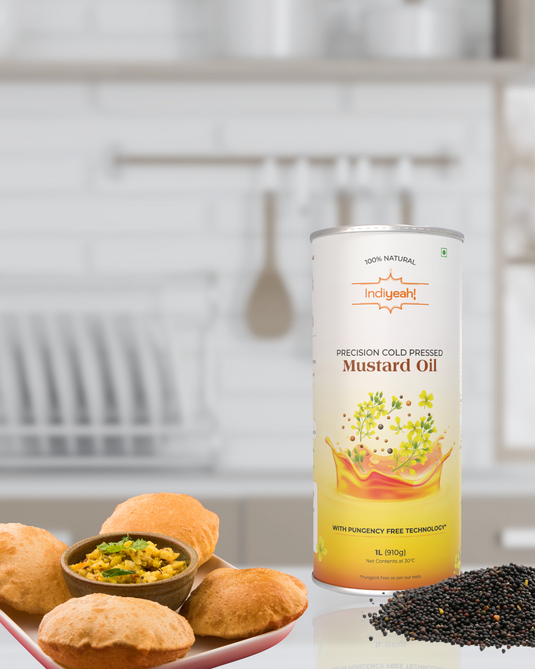Seed oils have been a hot topic in health and nutrition discussions, often surrounded by confusion and conflicting information. From claims that seed oils are toxic to allegations that they are entirely unhealthy, the narrative can be overwhelming. Let’s try to separate some myths from the facts, clarifying this widely used ingredient. Let’s explore the truth about seed oils and their place in a balanced diet.
What Are Seed Oils?
Seed oils are extracted from the seeds of plants. These oils are commonly used in cooking, baking, and even cosmetics. Their versatility and nutritional profiles make them a staple in kitchens worldwide. Some commonly known seed oils are
-
Sunflower oil
-
Soybean oil
-
Canola oil
-
Sesame oil
-
Flaxseed oil
-
Groundnut oil
-
Mustard oil
In recent times, western countries launched a campaign against seed oils, framing them as unhealthy, primarily to promote their own edible oils like olive oil, corn oil, and soybean oil. This narrative gained traction with the rise of industrial food production and the marketing power of large corporations. Seed oils, including sesame, groundnut, and mustard oils—widely used in traditional cuisines of Asia and Africa—were portrayed as inferior due to their high omega-6 content, despite their rich history and health benefits in moderate consumption. The campaign leveraged scientific studies, often selectively interpreted, to associate seed oils with health risks like inflammation and heart disease, while conveniently ignoring the imbalance caused by the overuse of omega-6-rich industrial oils in Western diets. Adding to this distortion, the term "seed oils" became synonymous with highly refined and chemically processed oils, stripped of their nutrients and often containing harmful residues. This conflation ignored the distinction between these industrial products and traditional cold-pressed oils, which retain their natural nutrients and have been valued for centuries for their health benefits. This deliberate misrepresentation not only boosted the global market for Western oils but also undermined the traditional, cold-pressed oil industries in other parts of the world, disrupting food habits that had sustained communities for generations.
Common Misconceptions About Seed Oils
Myth: Seed Oils Are Highly Processed and Unhealthy
Fact: Not all seed oils are created equal. While some commercially available seed oils undergo extensive processing that may strip them of nutrients, cold-pressed and minimally processed options like Indiyeah Coldpressed oils retain their natural benefits. The usage of the term seed oil for refined seed oils only created misguided confusion about seed oils, which when extracted without heat and chemicals are in fact very healthy. Cold-pressed oils like Indiyeah oils, for example, maintain their antioxidants and essential fatty acids, contributing to overall health.
Myth 2: Seed Oils Are High in Harmful Omega-6 Fatty Acids
Fact: Omega-6 fatty acids are essential for the body. The issue arises when there is an imbalance between omega-6 and omega-3 fatty acid consumption. Oils like Indiyeah cold-pressed mustard oil have an excellent balance of these fatty acids, making it an ideal choice for maintaining this balance. Moderating intake and pairing seed oils with omega-3-rich foods like fish, walnuts, or flaxseeds can help maintain a healthy ratio.
Myth 3: Seed Oils Cause Inflammation
Fact: The claim that seed oils inherently cause inflammation is misleading. Chronic inflammation is influenced by a combination of factors, including overall diet, lifestyle, and health conditions. In fact, some seed oils, like flaxseed and sesame oil, contain anti-inflammatory compounds. The process of refining strips the oils of these beneficial compounds, leading to the misconception that oils cause inflammation. Cold-pressed oils which provide a balance of monounsaturated fatty acids (MUFA) to polyunsaturated fatty acids (PUFA), are excellent for maintaining heart health and reducing inflammation. The ideal ratio of MUFA to PUFA in cooking oils is approximately 1:1 to 1.5:1. This balance is considered optimal for supporting cardiovascular health and maintaining overall lipid balance in the diet. Oils such as groundnut (peanut) oil and sesame oil are closer to this ideal ratio compared to other commonly used oils.
Myth 4: Seed Oils Are Unsafe for High-Heat Cooking
Fact: The safety of seed oils at high temperatures depends on their smoke points. Oils like mustard, sunflower, groundnut, etc have high smoke points, making them suitable for frying and roasting. Choosing the right oil for your cooking method is key to preserving flavor and nutrition.
The Nutritional Benefits of Cold Pressed Seed Oils
-
Rich in Healthy Fats: Seed oils provide monounsaturated and polyunsaturated fats, which are beneficial for heart health.
-
Source of Vitamins: Many seed oils, like sesame oil, contain vitamin E, a powerful antioxidant.
-
Support for Skin Health: Seed oils are often used in skin care for their moisturizing and anti-inflammatory properties.
-
Essential Fatty Acids: Oils like groundnut and mustard are excellent sources of fatty acids, crucial for brain and heart health.
-
Groundnut Oil: Rich in monounsaturated fats, groundnut oil supports heart health and is versatile for frying and deep-frying due to its high smoke point.
-
Mustard Oil: Packed with omega-3 and omega-6 fatty acids, mustard oil is known for its anti-inflammatory and antimicrobial properties. It’s also a popular choice in traditional Indian cooking.
-
Sesame Oil: High in antioxidants and compounds like sesamol and sesamin, sesame oil supports heart health and has anti-inflammatory effects.
How to Choose the Right Seed Oil
To reap the benefits of seed oils, it’s important to choose wisely. Here are some tips:
-
Opt for Cold-Pressed Oils: These retain more nutrients compared to highly processed alternatives.
-
Consider Smoke Point: Use oils with higher smoke points for frying and oils with lower smoke points for dressings or light sautéing.
-
Diversify: Incorporate a variety of oils like groundnut, mustard, and sesame to gain diverse health benefits.
Cold Pressed seed oils have a rightful place in a balanced diet. They offer essential nutrients, versatility in cooking, and potential health benefits. Demonizing them without context overlooks their contributions to global nutrition and health.
Debunking the Fear-Mongering Around Seed Oils
The rise of misinformation has led to unwarranted fear surrounding seed oils. Here’s why these fears are largely unfounded:
· Misinterpreted Studies: Many claims against seed oils are based on studies conducted in isolated conditions that do not mimic real-life dietary patterns.
· Overgeneralization: Lumping all seed oils together ignores the vast differences in their processing methods and nutritional profiles.
· Scare Tactics: Sensationalized headlines often prioritize clicks over accuracy.
Understanding the truth about seed oils is just one step toward a healthier lifestyle. At Indiyeah, we’re committed to promoting informed choices with our range of cold-pressed oils that are natural, nutritious, and sustainable. Visit our website to explore our offerings and start your journey toward better health today. By embracing facts over fear, we can appreciate the role cold-pressed seed oils play in modern nutrition and use them wisely for our well-being.




